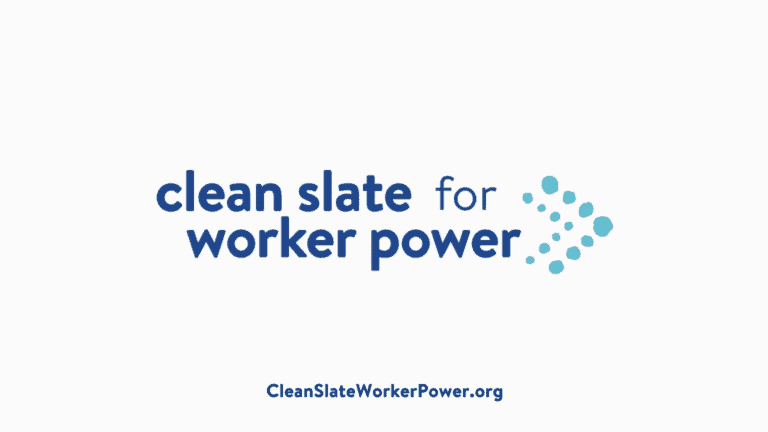
Sharon Block is a Professor of Practice and the Executive Director of the Center for Labor and a Just Economy at Harvard Law School.

Yoorie Chang is the Project Manager for the Clean Slate for Worker Power Project at Harvard Law School’s Center for Labor and a Just Economy.
Today is May Day – also known as International Workers’ Day – which was first observed in 1886, in the midst of the struggle for the 8-hour workday. Though much has changed about the ways in which we live and work over the last 137 years, the fundamental challenges that working people face in their struggles to improve wages and working conditions have not. Then and now, the concentration of capital into the hands of the few has limited opportunities for working people to get ahead. Decisions made at the top prioritizing profits in the short-term have come at the expense of the environment, the impacts of which have disproportionately burdened communities of color.
The crises of racial equity, climate change, and economic inequality are inextricably linked – as we reflect on how far we’ve come and consider how much further we have yet to go, how do we begin to build a framework for action that integrates the movements for labor, climate, and racial justice? Clean Slate for Worker Power convened a working group of over 30 advocates, organizers, academics, and labor leaders to explore this question. Today, we’re excited to share the culmination of our discussions with our new report, “Exploratory Principles: Making Progress for People and the Planet.”
Our working group discussions were grounded in a commitment to justice, equity, and democracy, and a recognition of the interconnected nature of the challenges we face. But given the wide range of backgrounds, fields of expertise, and lived experiences represented in our working group, consensus was never our goal in exploring what an intersectional framework for understanding these issues could look like. Rather, we embraced the diversity of perspectives and opinions represented in the group, which enriched the thoughtfulness of our discussions and helped us find common ground.
In our report, we highlight three key principles that emerged from our discussions, which we invite readers to use to ensure that every movement space is one in which racial equity, economic inequality, and climate change are considered. In addition, we outline practical action steps to help guide this integrated exploration. In the spirit of everything we do in the Clean Slate for Worker Power project, we believe that the approach outlined in the report is an ambitiously practical approach for seeking greater justice.
True democracy requires inclusive political power and greater civic engagement.
A cornerstone of the Clean Slate project has been the belief that in order to enable regular people to build power to countervail the outsized influence of corporations and the wealthy, we must be willing to fundamentally reimagine how our laws and systems could work and pursue bold and innovative solutions to that end. We must explore new models for democratic participation and labor law reform as the means through which we can expand power in economic and political spheres. A key step we can collectively take towards doing so is to adopt a broader and more inclusive consideration of relevant stakeholders across movements. For example, we encourage readers to consider actively supporting labor law reform as a means of building sufficient power to tackle policy priorities that advance equity and to expand your definition of stakeholders to ensure that you always have cross-cutting perspectives “in the room where it happens.”
We should all be guaranteed a bundle of economic rights that follow us regardless of where we work or live. We cannot rely solely on markets to ensure economic opportunity, inclusion, and security.
Our current system in the United States that links access to benefits with employment is outdated and suggests that basic rights are only available to those who have a job. We discuss how we can work together to rethink what a social safety net advancing economic citizenship could look like. To achieve our shared goals, we can start by developing a common language with which we can effectively communicate with policymakers and one another to emphasize the value of expanding public goods. Taking steps to consider how we measure the value of public goods is key to ensuring that we integrate a racial equity lens in assessing policy options.
We need a market-shaping approach to government that employs strategies that integrate racial, economic, and climate justice wherever possible.
It is possible to shape economic policy to prioritize the well-being of people and the environment, rather than solely the interests of corporations. We question the assumption that economic prosperity and environmental stewardship are always in conflict as one that is propagated by corporations to maintain their power. As implementation of the Biden administration’s slate of industrial policy bills continues to roll out, we call for considering how these policies can facilitate opportunities to empower workers and advance racial equity goals. To advance this principle, we recommend that readers consider approaches such as using a distributional impact analysis of policies instead of just an aggregate one to better understand how communities are affected. We also raise the value of setting expectations for corporations to undertake citizen participation analyses when taking actions that impact our communities, especially if public money is involved.
At the heart of this report is the belief that real progress is only possible through collaboration and collective action. We call on movement leaders, advocates, organizers, and policymakers to recognize how intertwined the goals of the movements for racial, economic, and climate justice fundamentally are. Only by working together across movements and sectors can we build collective power for the people to demand a more equitable and sustainable society that works for everyone, not just a privileged few.
Read “Exploratory Principles: Making Progress for People and the Planet” here.








Daily News & Commentary
Start your day with our roundup of the latest labor developments. See all
February 13
Sex workers in Nevada fight to become the nation’s first to unionize; industry groups push NLRB to establish a more business-friendly test for independent contractor status; and UFCW launches an anti-AI price setting in grocery store campaign.
February 12
Teamsters sue UPS over buyout program; flight attendants and pilots call for leadership change at American Airlines; and Argentina considers major labor reforms despite forceful opposition.
February 11
Hollywood begins negotiations for a new labor agreement with writers and actors; the EEOC launches an investigation into Nike’s DEI programs and potential discrimination against white workers; and Mayor Mamdani circulates a memo regarding the city’s Economic Development Corporation.
February 10
San Francisco teachers walk out; NLRB reverses course on SpaceX; NYC nurses secure tentative agreements.
February 9
FTC argues DEI is anticompetitive collusion, Supreme Court may decide scope of exception to forced arbitration, NJ pauses ABC test rule.
February 8
The Second Circuit rejects a constitutional challenge to the NLRB, pharmacy and lab technicians join a California healthcare strike, and the EEOC defends a single better-paid worker standard in Equal Pay Act suits.